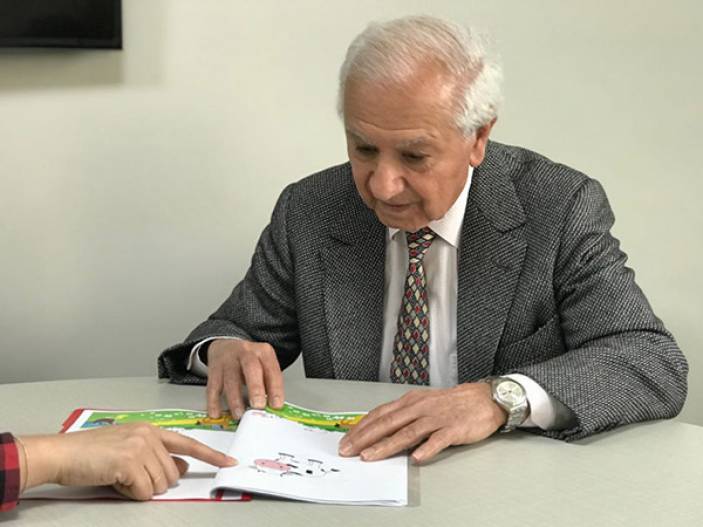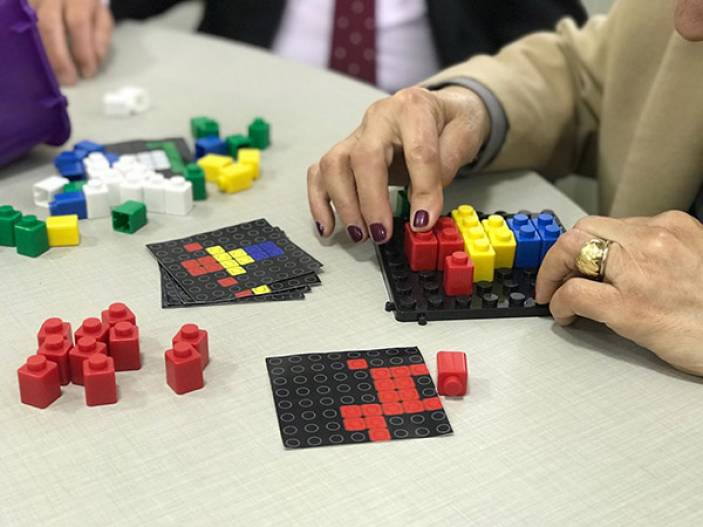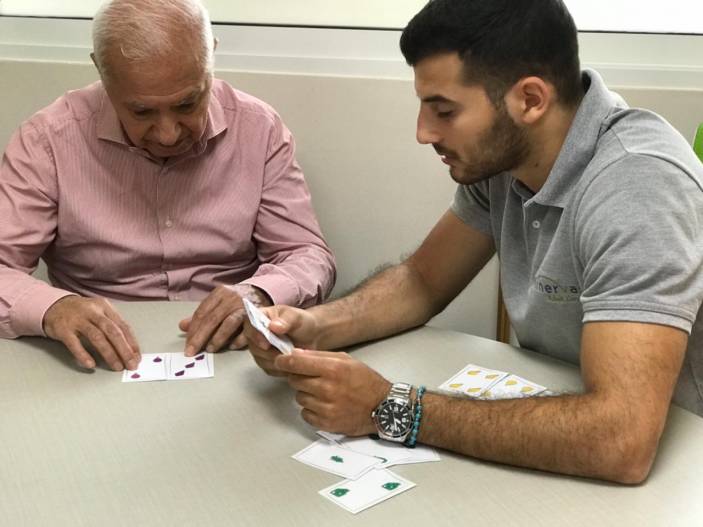
Dementia affects more than 7% of the population of Lebanon, which is higher than the global prevalence average. Studies show that younger relatives are expected to provide care and support to older family members with dementia. As the disease progresses, the person with dementia requires more care and attention, which can add a burden to the caregiver, affecting their mental and physical health, family life, livelihood and financial security.
How did the idea of the centre start?
Four years ago, HelpAge Network member the Alzheimer’s Association in Lebanon (AAL) decided to open an Alzheimer’s-friendly centre. Every week we conducted Support Group Meetings to support Alzheimer’s caregivers by giving them tips, guidance and opportunities to share their experiences with each other. The aim was to reduce their stress, loneliness, fear and isolation.
These meetings gave us a good insight into the behaviour and feelings of people living with dementia, and the challenges that their caregivers can face. We wanted to create a centre where people living with Alzheimer’s would spend the day, have fun, and stay physically, mentally and socially active in the community. We also wanted to help caregivers keep a balance between their care tasks, work and personal life.
Dr Georges Karam, president of the association, had always dreamed of opening a centre for people with Alzheimer’s. When his grandmother, Minerva, developed dementia all his family cared about was how to make her happy, and how to keep her busy and entertained. Dr Karam’s dream came true. The Alzheimer’s Day Care centre first opened its doors in March 2018 and they named it “Minerva Adult Care”, after Dr Karam’s grandmother.
A happy and safe space

The centre is a fun and safe space where people with Alzheimer’s and other dementias engage in several activities in a social setting. Our professional team conducts interactive activities related to concentration, memory, speech, physical activity, music and art. Our members get a chance to be out of the house “on their own” and participate in beneficial activities while they enjoy each other’s company – even forming friendships along the way.
When participants arrive in the morning, we can see in their eyes how happy and excited they are to come and spend the day. They ask, “What are the plans for today?” They feel comfortable and relaxed as if they are at home or in a place that they know well. They even offer their help with activities’ preparations and arrangements. When they are confused or don’t know who is coming to pick them up they ask us and trust what we tell them. When it’s time to leave they ask their caregivers to stay for longer, “it’s still early to go home, join us if you want.”
Meanwhile, older people’s caregivers get a chance to rest, run errands or simply go to work knowing that their loved one is spending time in an enriching, safe and social environment.
Some key challenges
Making the dream a reality has been challenging. Our first challenge was finding an adequate location for the centre. It was hard to find a big space that is suitable for older people and people with Alzheimer’s, and to find a calm neighbourhood with available car parking space. Our centre is now located in a new, big and colourful place in Achrafieh, Beirut. The centre is suitable for older people and has a security system for safety. Finding a qualified team was also a challenge. In Lebanon, universities and educational programmes don’t focus much on older people and Alzheimer’s so it took some time to find a qualified team with knowledge in the field. We also looked for a team with specific qualities when taking care of older people, such as patience, passion and respect. We continue to provide training as part of our capacity building programme.
We also faced cultural challenges. The idea of a day-care centre for adults is new in Lebanon. Caregivers sometimes think it’s their job to care for their older relatives and might feel guilty, afraid, anxious or sad when they first leave their loved ones in the centre. With time though they notice how entertaining and beneficial this is for their loved ones and how much they love it. However, stigma is still present in our country, and a lot of people believe that older people, especially if they have dementia, are not “aware” anymore and should stay at home doing nothing while watching their physical and mental health deteriorate with time.
There are also financial challenges; some caregivers can’t afford the fees to register their relatives. We cover the fees for some participants who can’t afford them, although there is now a waiting list.
Building on success and looking ahead

When they come to the centre, our members’ mood changes and they become happier and more energetic. Their body movement and balance, speech, eye movement and concentration improve. When they can’t come to the centre they tell their caregivers how much they miss it. A caregiver once told us, “we were only counting down the days on the couch in the house, watching the walls and doing nothing. Now that my father comes to the centre, his life has changed and I can see him smiling again!”
Caregivers have also told us that their relatives have improved their cognitive, physical and mental faculties. They see them smiling more, participating more in talks, expressing their needs (such as food, water and the bathroom.), walking more in the house and sleeping better during the night. This positive feedback motivates us to keep moving forward and growing.
Our vision is to expand and have many centres in different places in Lebanon so that the whole community can benefit from our services. We would like to have a community free of stigma where everyone is aware that people living with dementia are emotionally and physically present and have the right to stay active.
